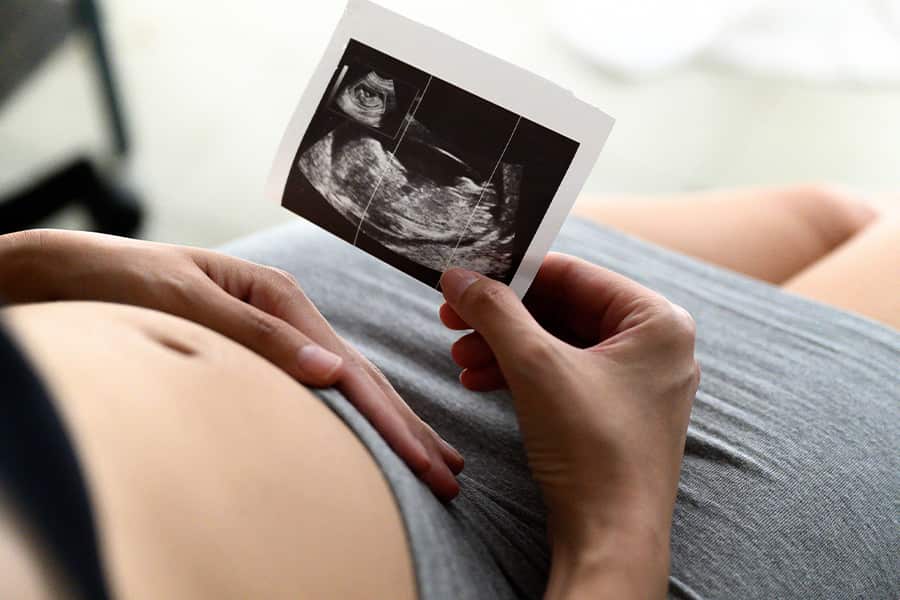
Reaching the 14-week mark of pregnancy is an exciting milestone as you inch closer to meeting your little one. At this stage, an ultrasound appointment becomes particularly significant as it plays a crucial role in establishing the due date of your pregnancy. The ultrasound performed around 14 weeks offers valuable insights into your baby's growth and development while providing an accurate estimation of when your bundle of joy will arrive. In this article, we will explore the purpose of the ultrasound exam at 14 weeks pregnant and shed light on what to expect during this appointment.
The purpose of an ultrasound exam at 14 weeks pregnant is to establish the “due date”. The due date is a calculated estimation of when the mother can expect to go into labor and deliver her baby. The due date is determined from a formula that takes into account the first day of your last normal menstrual period (LMP). The 14-week ultrasound helps confirm if this estimated date aligns with the baby's growth and development. Always remember that the due date is a calculation, an educated guess as to when to expect to go into labor. Babies set their own schedule and very often come close to the date, not on that date.
During the 14-week ultrasound, the healthcare provider or ultrasound technician will carefully examine the baby's growth and development. They will measure various fetal parameters, such as the crown-rump length (CRL), head circumference, and limb lengths. These measurements help assess the baby's growth and ensure they are progressing as expected for their gestational age. Comparing these measurements to standardized growth charts allows for a more accurate estimation of the due date.

Another significant aspect of the 14-week ultrasound is the opportunity to visualize your baby's anatomy in more detail. As the baby continues to grow, the ultrasound can provide clearer images of their developing organs, limbs, and features. This visual assessment helps ensure that the baby's anatomy appears normal and supports overall healthy development.
While the 14-week ultrasound primarily focuses on confirming the due date and assessing fetal growth, it also serves as an opportunity to identify potential abnormalities. Although most significant structural anomalies are typically screened for during the anatomy ultrasound around 18-20 weeks, certain visible abnormalities may be detected earlier. The ultrasound can help detect any obvious issues and prompt further evaluation or referral to a specialist if needed.
During the 14-week ultrasound, the position of the placenta is also assessed. The placenta plays a vital role in providing oxygen and nutrients to the baby throughout pregnancy. Determining its location is important, as an anterior (front) or posterior (back) placement can impact the sensation of fetal movement and the experience of kicks and punches.

Around 14 weeks, some parents may choose to find out their baby's gender during the ultrasound appointment. While it is not the primary purpose of the ultrasound, the baby's genitals may be visible during this time, allowing expectant parents the option to learn the gender if they wish. It is essential to note that gender determination at this stage may not be as accurate as during a dedicated gender ultrasound later in the pregnancy.
The 14-week ultrasound appointment is not only a medical procedure but also a significant emotional experience for expectant parents. Seeing the baby's growth, observing their movements, and hearing the heartbeat can deepen the emotional bond between parents and their little one. The ultrasound offers an opportunity to visualize the developing life within and helps parents connect on a more profound level.
An ultrasound examination at 14 weeks pregnant serves a crucial purpose in confirming the due date of your pregnancy and providing essential information about your baby's growth and development. It allows healthcare providers to refine the estimated due date based on accurate measurements and assessments of fetal anatomy. Beyond the medical aspect, the 14-week ultrasound is also a special moment for expectant parents to bond with their baby and experience the wonder of pregnancy. Cherish this milestone and embrace the journey as you eagerly await the arrival of your little bundle of joy.
The information is presented as a general guide to present information about the value of the 14-week ultrasound examination. It is for informational purposes only. The information provided is not intended to be the only information available about the value of the 14-week ultrasound examination. The material provided is not expected to be a substitute for advice or information from your physician or health care provider.
If you have any questions, concerns, apprehensions, unease, or worry about the 7-week ultrasound examination contact your health care provider immediately.


ALL WARRANTIES OF ANY KIND WHATSOEVER EXPRESS, IMPLIED, AND STATUTORY, ARE HEREBY DISCLAIMED. ALL IMPLIED WARRANTIES OF MERCHANTABILITY AND FITNESS FOR A PARTICULAR PURPOSE ARE HEREBY DISCLAIMED. THE PRODUCTS SOLD, INCLUDING SONOGRAMS, ULTRASOUNDS, FAKE PREGNANCY DOCUMENTS, AND FAKE PREGNANCY TESTS ARE SOLD ‘AS IS’ BASIS.
THE SITE CANNOT AND DOES NOT CONTAIN [MEDICAL/ LEGAL/ FITNESS/ HEALTH/ OTHER] ADVICE. THE INFORMATION IS PROVIDED FOR PRANKS PURPOSES ONLY AND IS NOT A SUBSTITUTE FOR PROFESSIONAL ADVICE.
ACCORDINGLY, BEFORE TAKING ANY ACTIONS BASED UPON SUCH INFORMATION, WE ENCOURAGE YOU TO CONSULT WITH THE APPROPRIATE PROFESSIONALS. WE DO NOT PROVIDE ANY KIND OF MEDICAL/ LEGAL/ FITNESS/ HEALTH ADVICE. THE USE OR RELIANCE OF ANY INFORMATION CONTAINED ON THIS SITE, OR OUR MOBILE APPLICATION, IS SOLELY AT YOUR OWN RISK.
THIS WEBSITE DOES NOT PROVIDE MEDICAL ADVICE. THE INFORMATION, INCLUDING BUT NOT LIMITED TO, TEXT, GRAPHICS, IMAGES AND OTHER MATERIAL CONTAINED ON THIS WEBSITE ARE FOR PRANK PURPOSES ONLY. NO MATERIAL ON THIS SITE IS INTENDED TO BE A SUBSTITUTE FOR PROFESSIONAL MEDICAL ADVICE, DIAGNOSIS OR TREATMENT. ALWAYS SEEK THE ADVICE OF YOUR PHYSICIAN OR OTHER QUALIFIED HEALTH CARE PROVIDER WITH ANY QUESTIONS YOU MAY HAVE REGARDING A MEDICAL CONDITION OR TREATMENT AND BEFORE UNDERTAKING NEW HEALTH CARE REGIMEN, AND NEVER DISREGARD PROFESSIONAL MEDICAL ADVICE OR DELAY IN SEEKING IT BECAUSE OF SOMETHING YOU HAVE READ ON THIS WEBSITE.
THE PARTIES AGREE THAT ANY PRODUCT PURCHASED ON THE BABY MAYBE WEBSITE SHALL NOT BE USED FOR ANY PROPOSE OTHER THAN AS A PRANK. WITHOUT EXCEPTION NO BABY MAYBE PRODUCT SHALL BE PROVIDED/SUBMITTED TO ANY GOVERNMENTAL OR OTHER AGENCY, MEDICAL DOCTOR, ARBITER OF A DISPUTE, AS PROOF OF PREGNANCY, PAST OR CURRENT, OR TO CLAIM ANY BENEFIT FOR WHICH A PREGNANT WOMAN MAY BE ELIGIBLE, OR ENTITLED TO RECEIVE, BASED ON HER BEING PREGNANT. NO HIPAA PROTECTED PATIENT HEALTH INFORMATION CONNECTED TO ANY BABY MAYBE PRODUCT, IS INTENDED, OR CONVEYED, WITH RESPECT TO THIS SALE.
THE PARTIES AGREE THAT BABYMAYBE IS NOT RESPONSIBLE FOR ANY LIABILITY WHATSOEVER FOR DELAYS IN SHIPPING THE PRODUCT. THE PARTIES FURTHER AGREE THAT THE SOLE REMEDY FOR ANY SHIPPING DELAYS IS THE REFUND OF THE PURCHASER’S PAYMENT FOR THE PRODUCT.
THE PARTIES AGREE THAT THE FORUM FOR ANY LEGAL ACTION ASSOCIATED WITH THE SALE AND PURCHASE OF THE PRODUCT IS THE STATE OF ILLINOIS.